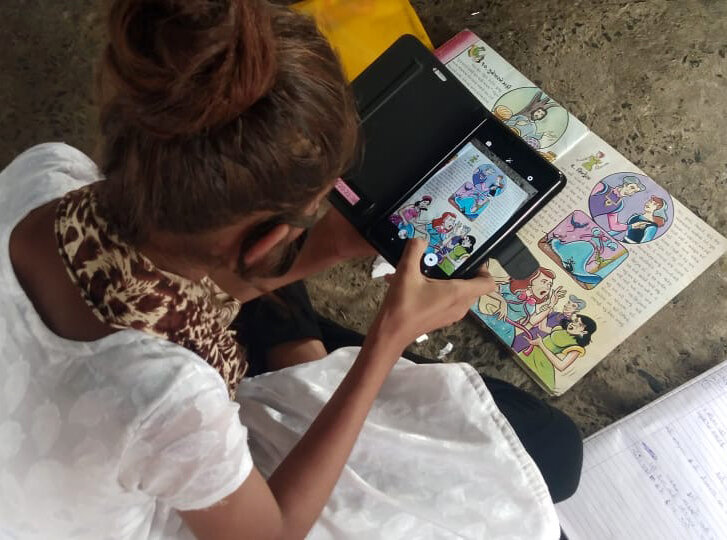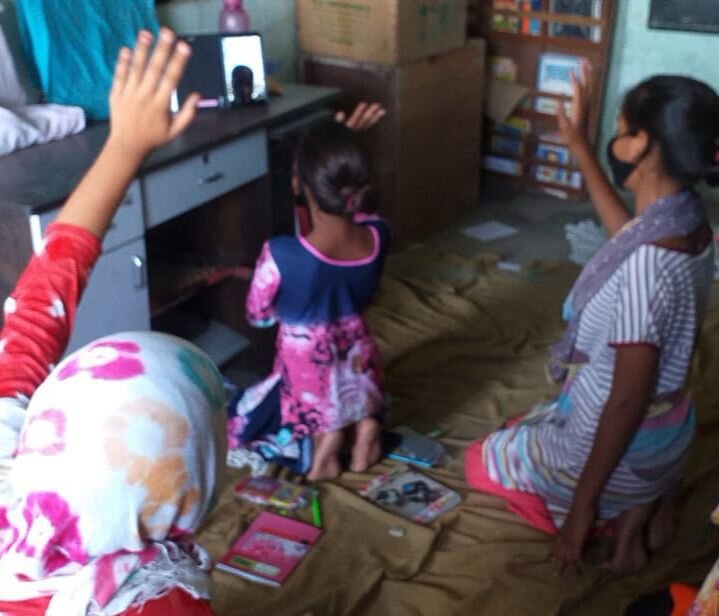For our final Partner Spotlight of the season, please welcome Meera Malek from Centre for Development in India as she shares her community's story of 2020!
Our deepest thanks to our partners around the world who have continued their life-changing work throughout this pandemic, and to supporters like you who help make it all possible.
Note: KEI is the Educational Program of CFD, and LitClubs are a part of KEI.
Q: Can you tell us about this year and how the pandemic has affected your community?
Meera (center) with her LitKids
Meera: The negative socio-economic impact of the pandemic on those who depend on daily wages and the multitude of service providing occupations in the unorganized sector is beyond our imagination; and is unfolding in front of our eyes as the days go by.
Since CfD works with the most marginalized and vulnerable families across the city, we could see the catastrophe coming. CfD immediately sent out an appeal to civil society to support an initiative to provide food stocks to the most vulnerable families.
During April and May, CfD reached out to about 2,000 families in distress (which includes the families of all the girls who are part of the Kadam Education Initiative and the families of the children that are part of LitClubs) and provided food stocks. Food kits consisting of cereals, salt, sugar, tea, condiments, and more were packed and distributed amongst the selected families by a team of dedicated Muslim and Dalit youth volunteers supported by CfD. CfD staff and volunteers – including senior Kadam girls – were all continuously engaged in procuring, packing, and distributing food kits, with full safety precautions being taken (maintaining distance, hand hygiene, and wearing masks/cloth to cover the nose and mouth.)
Now, it is not just a question of survival in an economic crisis that is going to be worsening over the coming year; but also about how the children are going to continue their education, and retaining the girls in a situation where families are losing hope.
CfD LitKids continuing their education from home
By June 2020, the girls in KEI and LitClubs – who were enabled through considerable efforts to postpone their marriage – were already being pressured into marriage. The crisis is spurred by their mothers and relatives to get them married as soon as possible. The situation where the girls were enabled to join KEI and continue their education either in school or through National Institute of Open Schools and also gain life/employable skills is back in a different context. There are different reasons relatives use to justify their insistence on stopping the girls’ education and readying them for marriage.
But KEI-CfD has resolved to reach out to the girls and their mothers once again to appeal to them to conserve the gains that their girls have made over the past 2-3 years and not put an abrupt end to the same by succumbing to familial and social pressures to get them married. Counseling has been going on, and assurances given that any expense on account of online education (such as devices and connectivity required) would be taken care of by KEI. This enables our girls to access online education in their own schools and colleges, and also their education through NIOS with the help of NIOS tutors.
The 30 tablets purchased for the girls of Kadam Education Initiative and 11 tablets for the LitClub children were distributed to all of them before the 10th of July, 2020. Our volunteers called girls in groups of 2-3 at the CfD office so that there was no crowding and distance could be maintained. They were given a hands-on orientation about the tablet and how to use it for online sessions and learning
Q: Is there anything that was surprising or worked well this year?
LitKids reading together
Meera: I have worked with the communities for 10 years and they never communicate, but this year the communities came together and started having meetings and talking about problems and how to solve them. They slowly started enjoying each other’s company and having a relationship with each other. The girls had exams that they struggled to pass for the last 3-4 year and passed because they had so much time to study. Grandparents and elder family members got to spend time together.
I went to the families to distribute food kits; the girls were very happy to see me and we got to see the families each at a time. I personally feel that personal connection is so important to see each other’s faces.
Q: How have you been running or incorporating our work together/ LitWorld's programs this year?
Meera: During April, May, and June, the mentors and the partnership coordinator were constantly in touch with all the LitClub members and their parents over the phone. The children were very unhappy that during the lockdown they had to remain confined to their home, but the mentors and the partnership coordinators talked to them and helped them deal with the situation. The parents also needed emotional support to tide over the difficult situation in which they had to worry where the next meal would come from.
The mentors and the partnership coordinator were continuously engaged in helping the children understand what Covid-19 is, and what precautions (wearing masks and maintaining physical distance) to take to prevent infection and spread of the virus. The mentors would talk to small groups of children over WhatsApp video almost every day. The mentors also would engage them with simple LitWorld activities - reading, singing and art work.
During the first two months (April and May), the priority was to keep monitoring the food stocks of all the families given the fact that their parents had no means of livelihood due to the complete lockdown; and as soon as the mentors came to know that any family was short of food, they would be included in the Covid-19 lockdown relief project of CfD. The budgetary allocation for food and snacks in the LitWorld 2020 budget was added in along with other funds to ensure adequate food stocks for all families.
LitKids using their tablets
By early July we had started planning for a revival of the LitClubs. The decision to buy 11 tablets was also made to assist the process of revival, which was made possible through re-allocation of funds from the LitWorld – CfD budget. In July the mentors started the LitClubs each session engaging half the number of children to ensure physical distance.
The impact of the 7 strengths was visible during the lockdown. The way the children were curious to understand everything about Covid-19, and the lockdown, the way in which they cherished their friends and missed them, and tried to keep in touch with them through the mentors, and the occasional WhatsApp video calls, how a number of them responded to a call from another agency for drawings and paintings from children – all were indicative of the strengths they had gained and the way they could move ahead with Hope.
Q: What are the strengths of your community? If you had to assign one of the 7 Strengths to your community, which one feels the closest?
Meera: The 7 Strengths are very important to the community, and they are why I started LitClubs as well. The children of our LitClubs displayed strength and resilience in the face of a dangerous pandemic. It was far more difficult for this poor and lower middle class community to survive during the pandemic, as they were totally unemployed with no means of survival. But they joined hands to run community kitchens in their residential area, pooling together the food stocks they had received from the philanthropists and the government. This helped the community to strengthen their social bonding and survive collectively.
The women of the community played a significant role in this process of collective survival. When there were cases of domestic violence, the women decisively intervened to stop the brutality and give solid emotional support to the battered woman. Women’s interventions in violence in a couple of cases more or less put an end to such violence for the remaining period of the lockdown in those areas.
So we would attribute ‘courage’, ‘kindness’, and ‘hope’ as the three strengths that could be attributed to the community.
Q: If you had just one thing to share about our work together, what would it be?
Meera: The main focus for CfD has always been one child and the other activities are like pillars. To make a child complete and happy, we have to work with other stakeholders, etc. At CfD, we believe in no physical punishment, no judgement, and in providing a safe space for children, which goes well with the LitWorld vision.
Our kids are faced with various challenges and disasters ( man-made and natural), which makes them very serious. However, LitWorld programming provides them with places to be happy. One time I called some kids on the video call and they started singing the Hello Song, although they were not in LitClubs, showing joy and resilience.






